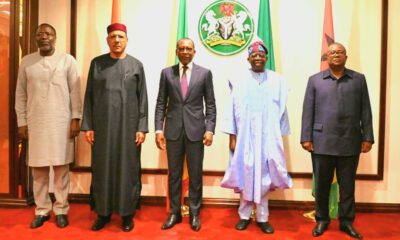Article of Faith
Religions and Persecution of Nonbelievers in Africa -By Leo Igwe
The document reveals that the demographics of nonbelievers are in single digits except in Mozambique and South Africa. But that should not surprise anyone. Few organizations for nonbelievers exist on the continent because there are limited spaces for advocacy of nontheistic views. The factsheet contains some instances of harassment, threats, and persecution of non-religious believers.
Published
5 years agoon
The document reveals that the demographics of nonbelievers are in single digits except in Mozambique and South Africa. But that should not surprise anyone. Few organizations for nonbelievers exist on the continent because there are limited spaces for advocacy of nontheistic views. The factsheet contains some instances of harassment, threats, and persecution of non-religious believers.
For instance, Said Djabelkhir, founder of the Cercle des Lumières pour la pensée libre (Circle of Enlightenment for Free Thought) was given a prison sentence and a fine for criticizing Islamic rituals and mocking the prophet Muhammad. In Nigeria, the president of the Humanist Association, Mubarak Bala, has been imprisoned without charge. The police arrested him following a petition that he made a Facebook post that allegedly insulted the prophet of Islam. In Sudan, the authorities arrested Mohamed Salih for changing the status on his identification card to nonreligious. But a judge declared that he was mentally unfit to stand trial and subsequently released him. This factsheet also highlights the persecution of nonbelievers in Uganda, Egypt, Tanzania, Somalia, and Kenya.
It draws attention to violations of the rights of non-believing students across the region. Nonbelieving students are not allowed to opt-out of religious classes and compulsory religious worship in schools.
This publication is a welcome development. It has the potential of transforming the belief/nonbelief landscape in the region.
Religious nonbelievers face challenges expressing their views and living out their beliefs because post-colonial African states are weak and unable to contend and limit undue influences of religions, especially Christianity and Islam. Post-colonial African states pay lip service to freedom of religion or belief of nonbelievers because governments are biased for a religion or some religions, the dominant religion(s).
Governments are biased against nonreligious and nontheistic beliefs. Even in cases where secularity or separation of church(mosque) and state is enshrined in the constitution, such provisions are paper tigers and are seldom enforced. What applies in countries are religious governments and politics; Christian/Islamic theocracies, not secular democracies. Religions determine the policies that are implemented and the laws that are enforced. States are an extension of churches, mosques, and temples. Religion trumps human rights, law, and constitution across Africa. Lack of separation of state and religion has turned the state into a tool to promote religion. It undermines the ability of states to guarantee equal rights of religious believers and nonbelievers. Lack of neutrality of the state on religious matters makes the government an instrument for religious oppression and persecution of nonbelievers. In countries where Islam is the de facto or de jure religion, governments persecute and discriminate against nonbelievers because state actors govern based on sharia, not state laws. State officers make policies and legislate to appease the Ummah. Nonbelievers are designated as infidels. And the state machinery is used to wage jihad, a holy war in the literal sense, against nonbelievers. Muslim theocrats sacrifice the humanity of nonbelievers on the altar of Islamic piety. Early in this 21st century, the violation of the humanity of nonreligious Africans must stop. This culture of abuse and impunity must end!
Nonreligious believers must enjoy equal rights with the believing folks. Nonbelievers are not asking for special treatment.
Nonbelievers demand that African states fulfill their obligations to their nonbelieving citizens.
Opinion Nigeria is a practical online community where both local and international authors through their opinion pieces, address today’s topical issues. In Opinion Nigeria, we believe in the right to freedom of opinion and expression. We believe that people should be free to express their opinion without interference from anyone especially the government.

Trending Articles


Why African Leaders Must Fix Governance Before Crying Sovereignty -By Isaac Asabor
One of the great contradictions of African leadership today is selective morality. Leaders speak passionately about international law while violating...


Baba Has Entered The Classroom -By Isaac Asabor
If what Trump is doing is walking into a noisy global classroom and insisting on discipline, then let us be...


As Trump Exposes Why Tinubu Must Go Sooner -By SKC Ogbonnia
The Nigerian president is not only culpable of heinous crimes, but he is also weakened beyond redemption. His continued stay...


How Lavrov’s Philosophy of “Ubuntu” Reflects on the Level of Africa’s Media Presence in Russia -By Kestér Kenn Klomegâh
The December 19–20 Ministerial Conference reaffirmed commitments to fully implement the Russia–Africa Partnership Forum Action Plan (2023–2026), adopted at the...

Why Trump’s Move Against Maduro Makes Sense -By Isaac Asabor
Trump’s decision also invites other nations to step up, to reconsider their passive complicity in the face of egregious abuse....